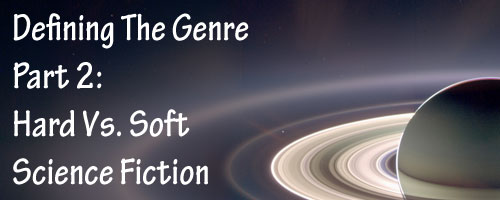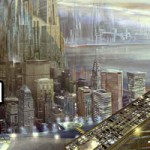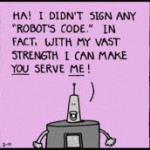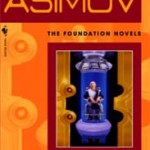
Now I know that you have all heard of the genre of literature called science fiction, or at least I hope you have. If you don’t know what science fiction is, check out my definition of it from last week’s installment! This week we are going to explore the difference between hard and soft science fiction. This would be an excellent time to note that just because a book, movie, television show, comic, etc. is hard or soft science fiction, it doesn’t mean that it can’t also be hard military science fiction or soft biopunk science fiction. The label of hard or soft is less of a sub genre than a descriptor.
Let’s start with defining hard science fiction. According to David Seed in his book A Companion to Science Fiction, hard science fiction is “a form of science fiction that displays an especially heightened concern for, and an especially heightened connection to, science” (Seed, 187). Now this seems like it should be obvious, but defining it can be a little tricky, as the term itself was used to describe literature long before anyone actually tried to define it. There are several different variations, in fact, in how the words “hard” and “science” are used to describe written work that will then change the definition. First there is “hard science story” which indicates that one or more of the “hard sciences” is involved in the telling of a story. Secondly there is “hard science fiction”. This would imply that the work is not only fiction but also takes a strong basis of its plot devices from one or more of the hard sciences. This second term can be more liberally applied than the first. Until the mid 1960’s, however, many terms were used interchangeably (Westfahl, 13-15)
Ok, ok, what are the hard sciences? That is important to know if the above definitions are supposed to make any sense (and the whole point of this article is to make sense of it!), so lets explore what they are and what they’re not. My good “friend” dictionary.com defines the hard sciences as “any of the natural or physical sciences, as chemistry, biology, physics, or astronomy, in which aspects of the universe are investigated by means of hypotheses and experiments” (Hard Sciences, 2008). With this definition you can see that the hard sciences are what you learned in your junior high and high school science classes. To be hard science fiction, then, is to incorporate these sciences, with emphasis on accuracy to the elements of fiction. Therefore a truly hard science fiction story wouldn’t have space ships flying faster than the speed of light.
It stands to reason, then, that soft science fiction deals with soft sciences. Having a Bachelors in one of these “soft sciences” (Psychology), I get a little touchy on the subject. I may not be able to go into a chemist’s lab and whip up some concoction, but I still know how to do empirical research, so let me explain what the “soft” sciences are and how that plays into science fiction. To do that, it must first be realized that “soft” was only a descriptor attached to denote the opposite of “hard” and perhaps a more accurate word would be “social”.
The words “hard” and “soft” themselves function only as indicators of how rigorously the scientific method can be applied to the sciences. Physics, for example, is a harder science than Psychology because it has a stronger mathematical basis. (Lemons, 100) The soft sciences are then the social sciences: political science, psychology, sociology, anthropology, and things of that nature. That is to say that saying “soft science fiction” may not be exactly accurate, and the correct terminology is “social science fiction”. Social science fiction differs also because unlike hard science fiction it doesn’t have communities attributed to it or a solid organization of writers (Seed, 189).
I got really technical there for a moment. Now that we got through all of that I can finally describe social science fiction as a genre. After all, that’s what I’m here to do, right? Social science fiction pays less attention to the rigors of science and focuses much more closely on social or political aspects. Space ships might be able to move faster than the speed of light or other possibilities that at this point in time seem like physical or scientific possibilities. The reader is more likely to get character development and socially forward messages without being bogged down with knowing what the circumference of a circle is or the exact speed at which sound travels.
If you’re looking for hard fiction check out:
- Red Mars (Mars Trilogy)
by Kim Stanley Robinson
- Excession
by Iain M. Banks
- The Man Who Pulled Down the Sky
by John Barnes
- The Cold Equations
by Tom Godwin
- Eon
by Greg Bear
- They Shall Have Stars
by James Blish
A great resource for more hard science fiction is http://www.hardsf.net/
For Social Science fiction check out the following:
- Almost
anything
by Robert Heinlein
- Foundation
by Isaac Asimov (Or really almost anything by him as well, he in fact coined the term social science fiction)
- Fahrenheit 451
by Ray Bradbury
- The Left Hand of Darkness
by Ursula K. Le Guin
- The Time Machine (Enriched Classics (Pocket)
by H.G. Wells
- Earth Abides
George R. Stewart
References:
- “HARD SCIENCE.” Dictionary.com Unabridged (v 1.1). Random House, Inc. 21 Aug. 2008. Dictionary.com. Lemons, John. Scientific Uncertainty and Its Implications for Environmental Problem Solving. New York: John Wiley & Sons, Incorporated, 1996. p100
- Seed, David, ed. A Companion to Science Fiction. Grand Rapids: Blackwell Limited, 2005. 187+.
- Westfahl, Gary. Cosmic Engineers : A Study of Hard Science Fiction. New York: Greenwood P, 1996. pp 13-15







Great list! For an overlooked predecessor of “soft” science fiction, check out The Green Ray, translated by Karen Loukes and published by Luath Press.
A fascinating read and insight into the development of the genre.
is Doctor Who considered as ‘hard or soft’ science fiction
@Theresa: Soft, but I wouldn’t use it as a knock against it. The best science fiction writers don’t/didn’t usually write “hard” science fiction: Jack Vance, Gene Wolfe, Ursula K. Guin, C.J. Cherryh, M. John Harrison, Brian Aldiss, Iain M. Banks (despite the article’s recommendation of a particular work of his in the “hard” list), Cordwainer Smith, Ray Bradbury, Frank Herbert, Philip K. Dick, Ian MacDonald, Harlan Ellison, etc. And even among the less literary works of pure escapism (Star Wars novels), soft science fiction is at least more entertaining that a lot of badly written hard science fiction is.
Too many hard SF writers have no interest in character development and other literary devices important to all genres of fiction, which is why it can get dull. The science should be used to tell the story, but a lot of writers just use the story as an excuse to play with the science. Hard SF fans also rarely read anything outside the genre, only interested in science. If I want detailed science I read actual science books and honest journals. When I read fiction, I want stories that are about people. The problem is that most people think that Arthur C. Clarke was a great writer. He wrote some interesting works, but he was far from a literary genius. Not all hard science fiction is bad of course (as long as the author knows that there’s more to science fiction that just the science), and not all of the hardcore fans are insufferable. To many of them are unable o suspend the own disbelief even an inch though, which is a pity. I love books that stretch the imagination, and mundane events are not what I look for in any speculative fiction book. Whether a work is hard or not should not determine whether a work is good or not. I’ve seen too may reviews where people complain about an otherwise good story, just because a “soft” plot device was used. I’m an aspiring scientist, but I appreciate a good story about time-travel or interplanetary exploration.
It is a matter of how scientific a reader wants his science fiction. It appears that more and more readers care less and less over the last 30 years. Movies and television need large audiences so the creators in those media will not strive for scientific accuracy to avoid alienating viewers.
What is Komarr by Lois Bujold? It contains an element of The Cold Equations that reviewers never discuss. Physics does not care about politics.